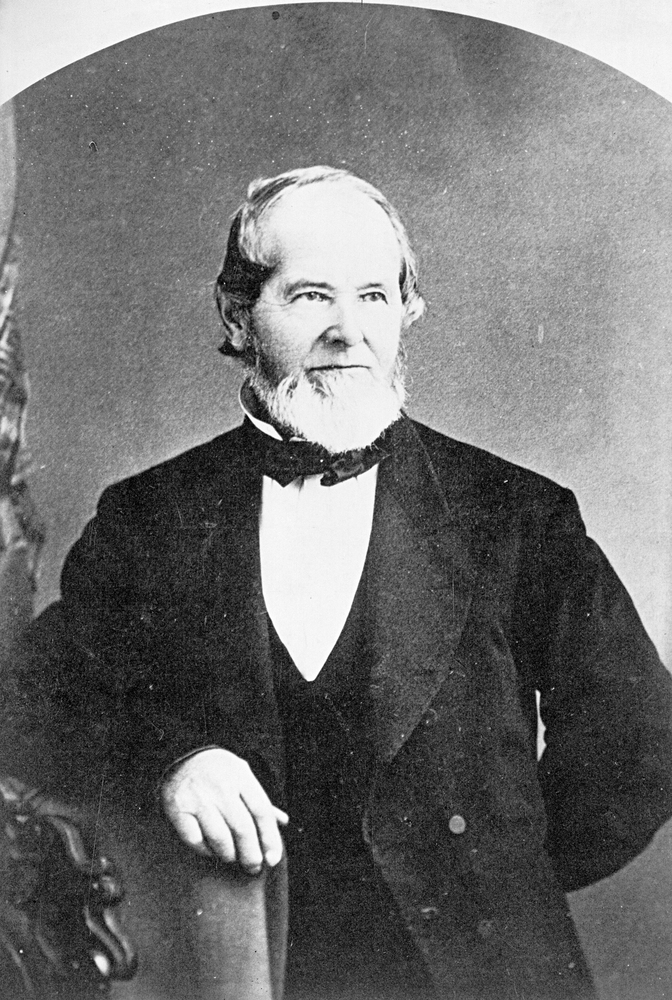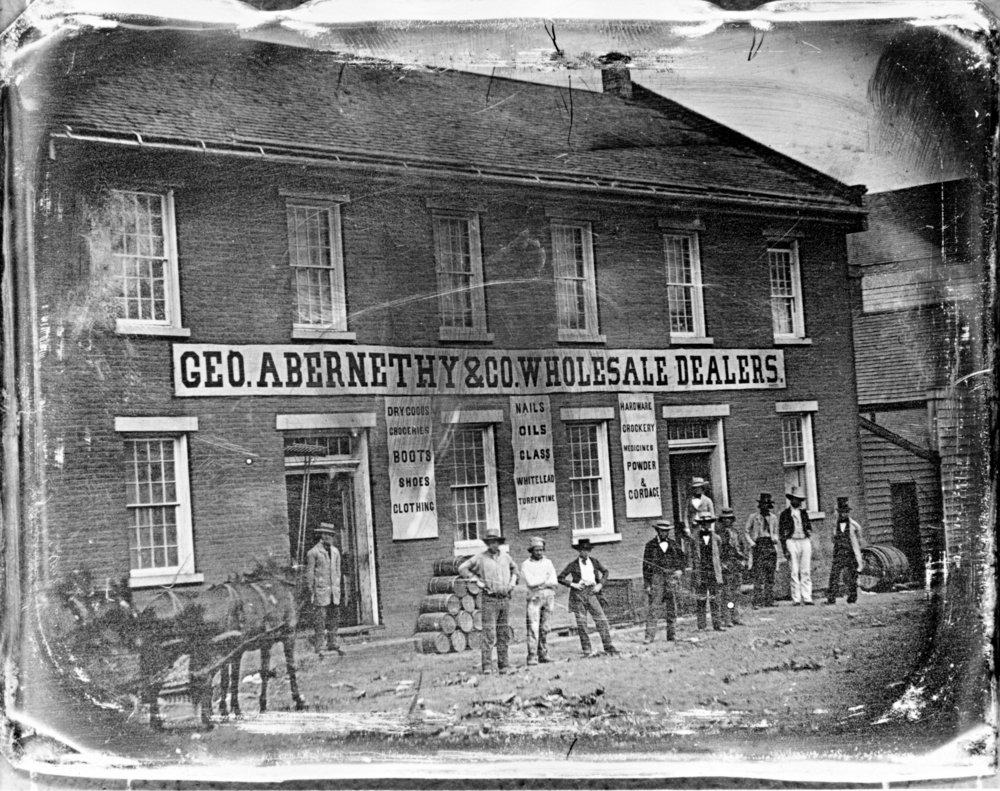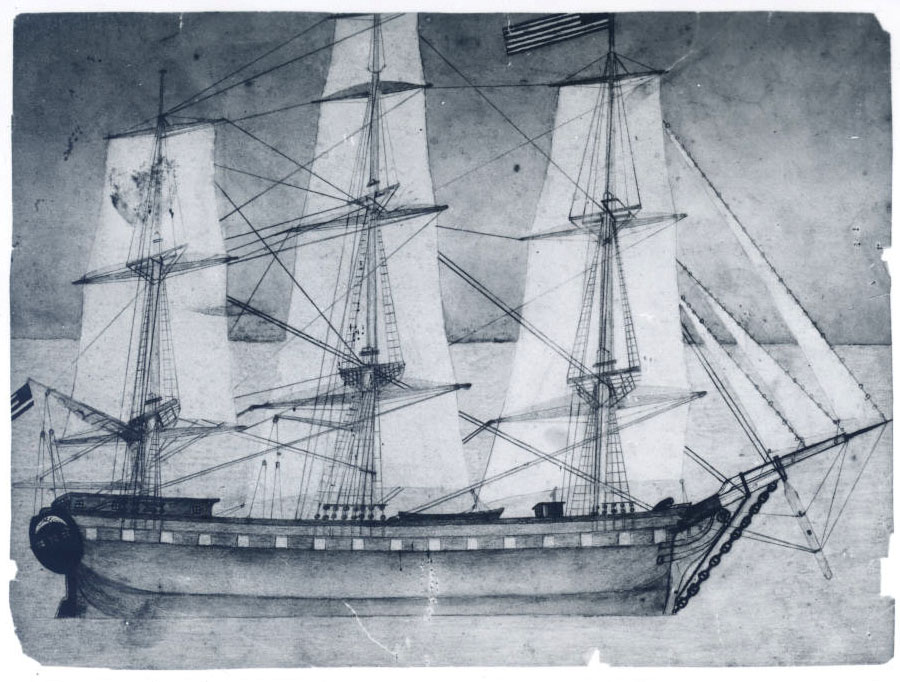George Abernethy cut a wide swath through Oregon's religious, economic, and political life from his arrival in 1840 until his death in 1877.
Born in New York City in 1807 and married in 1830, Abernethy came to Oregon in 1840 as part of the "Great Reinforcement" to the Methodists' endeavors in the Willamette Valley. As the mission's financial manager, he bought out its store when the mission closed in 1844 and moved it to Oregon City, the center of Oregon's settlement and trade. Four years later, he built a sawmill.
An astute politician, Abernethy became Oregon's first and only provisional governor, winning election in 1845 and 1847. He controlled Oregon's first newspaper, the Oregon Spectator of Oregon City from 1846 to 1855.
Abernethy's financial status grew with Oregon's. He aligned himself with Oregon's early establishment and snapped up John McLoughlin's expansive claim on Government Island in the Willamette River. One critic referred to Abernethy and his associates as a "class of mungralls [sic], neither American nor anti-American—a kind of foreign hypocritical go-between."
Governor Abernethy proposed a moderate course during the tumultuous years between Oregon's organization and its admission to the United States. His first message to the legislature, in late 1845, requested that it institute a militia, adopt a standard of weights and measures, and survey a new road into the Willamette Valley. The Barlow Road was established within the year.
The governor also wanted a pilot service to assist ships in crossing the Columbia River bar, strong schools, and a system of land claims that did not require settlers to travel long distances. On the contentious question of whether Oregon would be wet or dry, he strongly favored temperance but did not insist on imposing his will. If the electorate "say, through the ballot box ‘We wish liquor', then let it come free, the same as dry goods," he instructed the legislature, "but until the people say they want it, I hope you will use your influence to keep it out of the territory." Abernethy also guided Oregon's response to the killings at the Whitman Mission in 1847, quickly organizing the meeting that recruited militia volunteers and contributing funds to finance the militia that fought in the ensuing war.
The flood of 1861 destroyed much of Abernethy's property in Oregon City, and he moved his business operations to Portland, which was emerging as the young state's leading city. He used his ties with New York City wholesalers and Oregon merchants to rebuild his fortune.
Abernethy was a significant philanthropist. In 1849, he was among the major contributors to the Clackamas County Female Seminary, founded in 1850 as the territory's first nondenominational school for women. In 1856, he purchased Portland's first fire engine and continued throughout his life to work on behalf of the Methodists.
Little is known about his later life, but his name (sometimes misspelled Abernathy) appears on a school, a neighborhood in Portland, a creek and island in Clackamas County, and a bridge that spans the Willamette River between Oregon City and West Linn.
-
![George Abernethy, Oregon's first and only provisional governor, 1845 to 1849.]()
George Abernethy.
George Abernethy, Oregon's first and only provisional governor, 1845 to 1849. Oreg. Hist. Soc. Research Lib., bb003864
-
![]()
George Abernethy's wholesale store, Oregon City, 1850s.
Oreg. Hist. Soc. Research Lib., ba014129
Related Entries
-
![Great Reinforcement (1840)]()
Great Reinforcement (1840)
One of the signal immigrations to Oregon came by sea in 1840, years bef…
-
![Oregon Spectator]()
Oregon Spectator
Established in 1846, the Oregon Spectator was the first newspaper publi…
Related Historical Records
Map This on the Oregon History WayFinder
The Oregon History Wayfinder is an interactive map that identifies significant places, people, and events in Oregon history.
Further Reading
Carey, Charles H. A General History of Oregon Prior to 1861. 2 vols. Portland, Ore.: Metropolitan Press, 1935, 1936.
Corning, Howard McKinley, ed. Dictionary of Oregon History. Portland, Ore.: Binfords & Mort, 1956.
Johansen, Dorothy O. and Charles M. Gates. Empire on the Columbia: A History of the Pacific Northwest. 2d ed. New York: Harper & Row, 1967.




